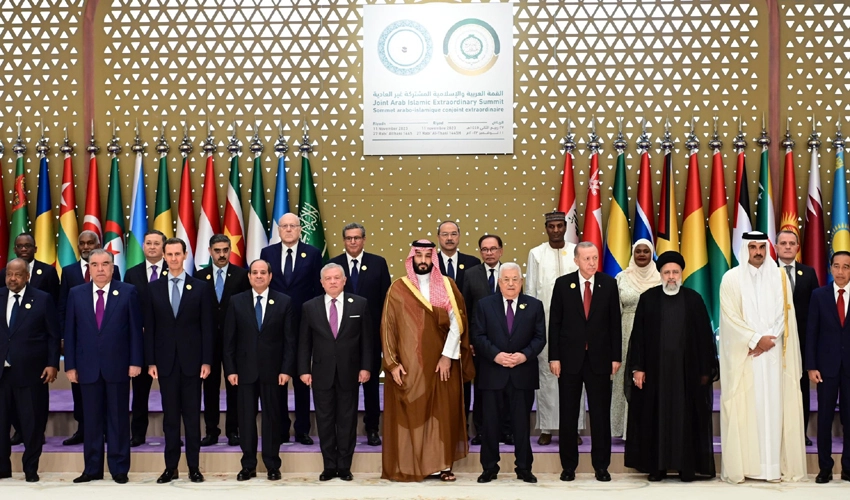Only way to guarantee peace in region is to end siege, bloodshed in Gaza: OIC

RIYADH, Saudi Arabia (AFP) - Arab leaders, Iran's president and Caretaker Prime Minister Anwaarul Haq Kakar on Saturday in the Saudi capital roundly condemned Israel's actions in its war against Hamas in Gaza, as fears mount the conflict could draw in other countries.
Host Saudi Arabia "confirms that it holds the occupation (Israeli) authorities responsible for the crimes committed against the Palestinian people," Crown Prince Mohammed bin Salman, the Gulf kingdom's de facto ruler, said as Saturday's summit began.
"We are certain that the only way to guarantee security, peace and stability in the region is to end the occupation, siege and the settlements," he said of Israel's actions in Gaza and the occupied West Bank.
Iranian President Ebrahim Raisi, on his first trip to Saudi Arabia since the two countries mended ties in March, said Islamic countries should designate the Israeli army a "terrorist organisation" for its conduct in Gaza.
Turkey's President Recep Tayyip Erdogan said at the summit that "it is a shame that Western countries, which always talk about human rights and freedoms, remain silent in the face of the ongoing massacres in Palestine."
Palestinian President Mahmud Abbas, for his part, said Washington had "the greatest influence on Israel" and "bears responsibility for the absence of a political solution" to the conflict.
Regional divisions
The Arab League and the OIC, a 57-member bloc that includes Iran, were originally meant to meet separately. Arab diplomats told AFP the decision to merge the meetings came after Arab League delegations had failed to reach an agreement on a final statement.
Some countries, including Algeria and Lebanon, proposed responding to the devastation in Gaza by threatening to disrupt oil supplies to Israel and its allies as well as severing the economic and diplomatic ties that some Arab League nations have with Israel, the diplomats said.
However, at least three countries -- including the United Arab Emirates and Bahrain, which normalised ties with Israel in 2020 -- rejected the proposal, according to the diplomats who spoke on condition on anonymity.
Prior to the meeting, Palestinian militant group Islamic Jihad said it did not "expect anything" to come out of it, criticising Arab leaders for the delay. "We are not placing our hopes on such meetings, for we have seen their results over many years," Mohammad al-Hindi, the group's deputy secretary-general, told a press conference in Beirut. "The fact that this conference will be held after 35 days (of war) is an indication of its outcomes."
Iran president in Riyadh
The roster of attendees on Saturday also included Egyptian President Abdel Fattah al-Sisi, Qatar's Emir Sheikh Tamim bin Hamad Al-Thani and Syrian President Bashar al-Assad, who was welcomed back into the Arab fold this year after an extended rift over his country's civil war.
Raisi is the first Iranian president to visit Saudi Arabia since Mahmoud Ahmadinejad attended an OIC meeting in the kingdom in 2012. Iran backs Hamas as well as Lebanon's Hezbollah and Yemen's Huthi rebels, placing it at the centre of concerns the war could expand.
The conflict has already fuelled cross-border exchanges between the Israeli army and Hezbollah, and the Huthis have claimed responsibility for "ballistic missiles" the rebels said targeted southern Israel. Analysts say Saudi Arabia feels vulnerable to potential attacks because of its close ties with Washington and the fact that it was considering normalising ties with Israel before the war broke out.
Kim Ghattas, author of a book on the Iran-Saudi rivalry, said during a panel organised by the Arab Gulf States Institute in Washington that "the Saudis are hoping that the fact they didn't normalise yet, and the fact that they have a channel to the Iranians, gives them some protection."
And, she added, "the Iranians are hoping that the fact that they're in touch with the Saudis and maintaining that channel, that it gives them some protection too."







